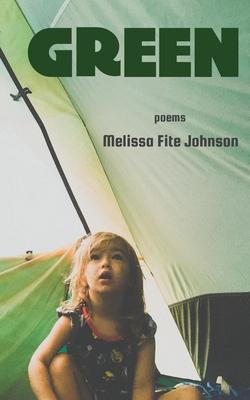These poems tell the story of loss: loss of a father stolen by disease, loss of innocence. And while it could easily stop there this collection doesn't. Instead, it gathers strength and finds its voice and its fight. With wonder and awe and some well-placed anger, we see these poems emerge on the other side with a bit of hope and even happiness.
The poems of Melissa Fite Johnson's Green excavate the bittersweet tenderness invoked by the collection's title. To be green is to be nave, heading into a sea of defining experiences, a vantage Johnson wonderfully explores in poems that chart the pains of girlhood: the casual critiques that stick, the difficulty of relationships with boys, family, friends. She also writes movingly of her disabled father. Grappling with the grief and guilt evoked by his death, Johnson admits, "If a poem resurrects, how many times have I tried?" While some losses cannot be reversed, it is in this act of writing that Johnson offers readers another vision of green: to grow through challenge, to will oneself to flourish despite pain, is to be fully alive, a trajectory Green reminds is possible for us all.
-Ruth Williams, author of Flatlands
In Melissa Fite Johnson's beautiful new book, Green, a body and a heart are both things that can be divided. Johnson looks at the way grief has its own language and how a mouth is a thing that can both create and erase. In these poems, the past has crystallized into desire lessons, the fear that accompanies those first encounters, and the inherited legacies that shape how we see ourselves. This book knows time slips away quickly but holds us in unflinching memory before releasing us to the wide and green world.
-Traci Brimhall, author of Come the Slumberless to the Land of Nod
In her latest poetry collection, Melissa Fite Johnson somehow manages to lace grief with hope, and questioning with reckoning. Love is at the heart of this collection, but not simple love: love that questions, love that demands, love that is irreverent and taxing, love in its fragility and strength. The poems dig through the rubble of youth and uncover hard truths, and the poems show how when we are young, we may think something horrible will swallow the rest of our lives, and then it doesn't, and how this is terrible and beautiful all at once. This poet writes of the connection we have as humans to each other, even when the string that ties us is so thin it can barely be found; yet she finds it, and she plucks.
-Shuly Xchitl Cawood, author of Trouble Can Be So Beautiful at the Beginning
The poems in Green, both searing and soft-hearted, span from early childhood to old age, and demonstrate with consistent poignancy that girlhood and womanhood are not separate phases of life but as interconnected as fibers in a leaf. Through the unique lens of the color green and all its complicated connotations-newness, nature, jealousy, and more-Johnson unflinchingly examines the many shades of human relationships, asking "What if?" before "time rusts the gate closed." These touching, impeccably crafted poems dare to heal the emotional wounds that come from living and loving in a gendered world.
-Marianne Kunkel, author of Hillary, Made Up
